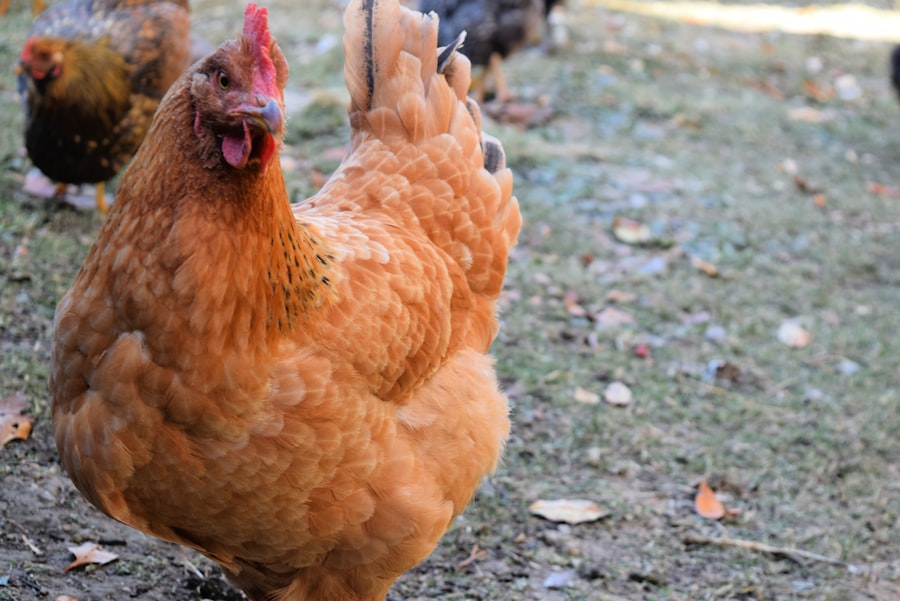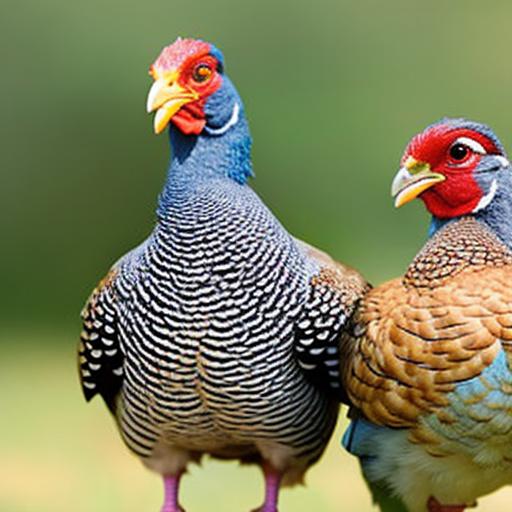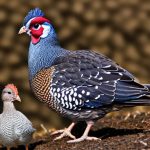Keeping guinea fowl and chickens together can be a rewarding experience for poultry enthusiasts. Both guinea fowl and chickens are popular choices for backyard flocks, and when kept together, they can provide a range of benefits, from pest control to increased flock diversity. However, it’s important to understand the unique characteristics of each species and how to successfully integrate them to ensure a harmonious coexistence. In this article, we will explore the benefits of keeping guinea fowl and chickens together, as well as provide tips for successful integration, housing and environment considerations, feeding and care guidelines, and strategies for managing potential conflicts between the two species.
Key Takeaways
- Keeping guinea fowl and chickens together can be beneficial for pest control and flock protection
- Integrating guinea fowl and chickens requires careful observation and gradual introduction
- Providing adequate housing and environment is crucial for the well-being of guinea fowl and chickens
- Feeding and caring for guinea fowl and chickens together requires a balanced diet and proper supervision
- Potential conflicts between guinea fowl and chickens can be managed through adequate space and supervision
Understanding the benefits of keeping guinea fowl and chickens together
There are several benefits to keeping guinea fowl and chickens together. One of the main advantages is pest control. Guinea fowl are known for their excellent bug-hunting abilities and can help keep the insect population in check around the coop and yard. Chickens also enjoy foraging for insects, so having both species together can create a more effective pest control team. Additionally, guinea fowl are known for their loud calls and alert nature, which can help alert the flock to potential predators. This can provide an added layer of security for the entire flock, including the chickens. Furthermore, integrating guinea fowl with chickens can add diversity to the flock, both in terms of appearance and behavior. Guinea fowl have unique personalities and behaviors that can add interest and variety to the overall flock dynamic. Overall, keeping guinea fowl and chickens together can create a more dynamic and efficient flock with added pest control benefits and increased diversity.
Tips for successfully integrating guinea fowl and chickens
Successfully integrating guinea fowl and chickens requires careful planning and consideration. One important tip is to introduce the two species when they are young. This can help them become accustomed to each other’s presence and reduce the likelihood of aggressive behavior later on. It’s also important to provide plenty of space for both species to roam and forage. This can help reduce competition for resources and minimize potential conflicts. Additionally, providing multiple feeding and watering stations can help prevent bullying and ensure that all birds have access to food and water. When introducing guinea fowl to an existing chicken flock, it’s important to monitor their interactions closely and be prepared to separate individuals if necessary. Finally, providing plenty of hiding spots and roosting areas can help reduce stress and provide refuge for birds that may need a break from social interactions.
Providing the right housing and environment for guinea fowl and chickens
Creating the right housing and environment for guinea fowl and chickens is essential for their health and well-being. When designing a coop or housing area, it’s important to provide separate roosting areas for guinea fowl and chickens. Guinea fowl prefer to roost at higher elevations than chickens, so providing elevated roosts or perches specifically for the guinea fowl can help reduce competition and potential conflicts. Additionally, providing ample space for both species to roam and forage is important. Guinea fowl are more active foragers than chickens and prefer open spaces, so providing a larger outdoor area with plenty of vegetation can help meet their needs. It’s also important to provide adequate shelter from the elements, including shade during hot weather and protection from wind and rain. Creating a diverse environment with plenty of hiding spots, dust bathing areas, and enrichment opportunities can help keep both guinea fowl and chickens happy and healthy.
Feeding and caring for guinea fowl and chickens together
Feeding and caring for guinea fowl and chickens together requires attention to their unique dietary needs. While both species enjoy foraging for insects, they also require a balanced diet that includes commercial poultry feed. When feeding both species together, it’s important to provide separate feeding stations to prevent competition and ensure that all birds have access to food. Additionally, guinea fowl have higher protein requirements than chickens, so providing a supplemental protein source, such as mealworms or game bird feed, can help meet their nutritional needs. It’s also important to provide access to grit or small stones, which both species require for proper digestion. Monitoring the flock’s overall health and body condition is important, as individual birds may have different dietary requirements or health considerations. Providing regular access to fresh water is essential for both guinea fowl and chickens, especially during hot weather or periods of high activity.
Managing potential conflicts between guinea fowl and chickens

While guinea fowl and chickens can coexist harmoniously, there may be occasional conflicts that arise. One common issue is aggression between individual birds, particularly during the integration process or when establishing a new pecking order. Providing multiple feeding stations, roosting areas, and hiding spots can help reduce competition and minimize potential conflicts. It’s also important to monitor the flock closely during the integration process and be prepared to separate individuals if necessary. Additionally, providing environmental enrichment, such as dust bathing areas or hanging treats, can help redirect aggressive behaviors and provide positive outlets for natural instincts. If conflicts persist, it may be necessary to separate individual birds or groups until they can be reintegrated successfully. Overall, proactive management strategies and careful observation can help minimize conflicts between guinea fowl and chickens and promote a peaceful coexistence within the flock.
Conclusion and final considerations for keeping guinea fowl and chickens together
In conclusion, keeping guinea fowl and chickens together can provide a range of benefits, from pest control to increased flock diversity. By understanding the unique characteristics of each species and implementing careful integration strategies, poultry enthusiasts can create a harmonious coexistence between guinea fowl and chickens. Providing the right housing and environment, as well as thoughtful feeding and care practices, are essential for maintaining the health and well-being of both species. Proactively managing potential conflicts through careful observation and environmental enrichment can help promote a peaceful coexistence within the flock. Overall, keeping guinea fowl and chickens together can create a dynamic and efficient flock with added pest control benefits and increased diversity, making it a rewarding experience for poultry enthusiasts.
If you’re considering keeping guinea fowl and chickens together, it’s important to provide them with a suitable coop. A well-designed coop can help ensure the safety and comfort of both species. For tips on creating an ideal coop for your feathered friends, check out Poultry Wizard’s article on A-Frame Chicken Coop. This resource offers valuable insights into building a coop that meets the needs of both guinea fowl and chickens, helping you create a harmonious living environment for your flock.
FAQs
Can guinea fowl and chickens be kept together?
Yes, guinea fowl and chickens can be kept together in the same coop and run. However, it’s important to introduce them to each other gradually and monitor their interactions to ensure they get along.
What are the benefits of keeping guinea fowl and chickens together?
Keeping guinea fowl and chickens together can provide benefits such as pest control, as guinea fowl are known for eating insects and ticks. Additionally, they can help protect the chickens from predators due to their alert nature and loud calls.
What should be considered when keeping guinea fowl and chickens together?
When keeping guinea fowl and chickens together, it’s important to consider the space requirements, as guinea fowl are more active and require more space to roam. Additionally, their different dietary needs should be taken into account, as guinea fowl require a higher protein diet compared to chickens.
Are there any potential challenges when keeping guinea fowl and chickens together?
One potential challenge when keeping guinea fowl and chickens together is their different social behaviors, as guinea fowl can be more aggressive and territorial compared to chickens. Additionally, guinea fowl are known for being noisy, which can be a concern for some keepers.
How can I introduce guinea fowl to an existing flock of chickens?
When introducing guinea fowl to an existing flock of chickens, it’s important to do so gradually and in a neutral territory. This can help reduce the likelihood of aggression and allow the birds to become familiar with each other before being housed together.
Meet Walter, the feathered-friend fanatic of Florida! Nestled in the sunshine state, Walter struts through life with his feathered companions, clucking his way to happiness. With a coop that’s fancier than a five-star hotel, he’s the Don Juan of the chicken world. When he’s not teaching his hens to do the cha-cha, you’ll find him in a heated debate with his prized rooster, Sir Clucks-a-Lot. Walter’s poultry passion is no yolk; he’s the sunny-side-up guy you never knew you needed in your flock of friends!







